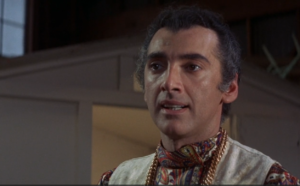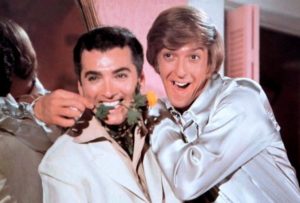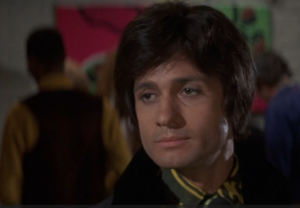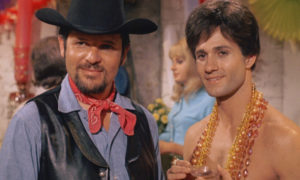As a purveyor of camp, I really appreciated the film for this week for the absolute festival that it is. I was struck, in particular, by its relation to another (more digestible) example of camp from the period called The Gay Deceivers (Bruce Kessler, USA, 1969). Two of the actors in Beyond the Valley of the Dolls who play incredibly minor roles also feature in The Gay Deceivers with much larger parts.
Some of you will have already heard my spiel about this film – and I’m sorry for subjecting everyone to it again, but it’s relevant I swear!
The Gay Deceivers is a film about two straight men pretending to be in a homosexual relationship in order to dodge the Vietnam draft. It was rated R at the time which made me believe that it had a very limited release, however my father told me that he recalled seeing it advertised when it came out (he would have been 14). The film is all about duplicity and presentation, “playing” straight in one circle and gay in another. The two young men have to toe the line between their straight, old-money families and the surveillance of the army that forces them to move into a predominantly gay neighborhood on the California coast. It uses genuine items of gay culture in its set dressing, taking on the “gay sensibility” to be possibly played for laughs but hiding a deep sincerity under its irony. Notably, Michael Greer, who plays the landlord of this gay neighborhood, worked with the director and writers to give a more accurate portrayal of the Californian gay scene at the time. A drag party filled with costumes of actual gay icons, the references to designers, the loving way in which Greer’s character refers to his partner as his husband, all help to ground the film in a real camp culture.
The connection to Beyond the Valley of the Dolls is, at first, merely in the shared cast members of Sebastian Brook and Christopher Riordan (pictured below in their respective roles in each film), but their themes fit together quite well.




In both films, the pressure to perform under the categories of straight or gay (in individual relationships as well as in personality) force these characters into rigid, uncomfortable, and even dangerous situations that are completely irrational outside of prescribed gendered roles. The camp element flourishes in these conditions, where all of these rules that are taken with such seriousness (under Sontag’s definition) are shown to be flimsy curtains draped across the possibilities of expression and self. The character of Elliot (played by Lawrence P. Casey) struggles with this the most in a fascinating way, where the line blurs between his promiscuous, frankly ridiculous oversexed straight lifestyle before the ruse begins and an introspective identity crisis that reframes him as possibly a repressed bisexual. (Also shout-out to this film for making me find out that people used “AC-DC” as a slang term for bisexuality which is how I shall refer to myself from now on!)
Rant over, I really love this film and its humor. Besides a few uncomfortable moments of typical 1960’s homophobia, its narrative overall ends up landing in favor of the gay community, albeit in a somewhat stereotypical way. You can watch the whole thing (besides a single scene) on YouTube here, and I definitely recommend it: https://youtu.be/8TrNwO5FZ8g